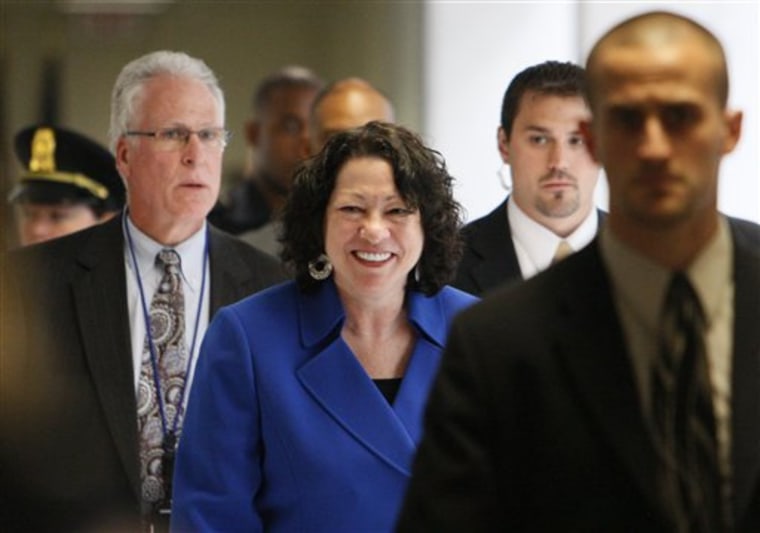A week before her Senate hearings, Republicans are floundering in their efforts to trip up Supreme Court nominee Sonia Sotomayor, unable to find an effective message about why she's not fit to serve.
Blame the tricky politics of opposing the woman who would be the first Hispanic justice, especially for a party struggling to broaden its base and whose chief spokesman on Sotomayor has a troubled history of racism allegations.
Add to that the mathematical impossibility of Republicans' rejecting President Barack Obama's first high court nominee, and it's a recipe for a weak-kneed response.
Conservative activists have noticed, and they're not happy.
"Too many Republicans and conservatives planned to lose instead of planning to win" the debate over Sotomayor, said Tom Fitton of Judicial Watch. His group has mounted strong opposition to the federal appeals court judge.
About half the Senate's Republicans are willing to raise serious questions about Sotomayor and there's "a sizable minority who — partly because she's Hispanic — just want this to go away," said Curt Levey of the Committee for Justice.
Conservative groups have sought to convince Senate Republicans that they can benefit politically by strongly opposing Sotomayor. But many of their leaders complain the message isn't getting through.
During recent confrontations, some activists have told GOP senators, "Don't throw away yet another conservative agenda item when it's a successful one for you. Your base cares about this and you should, too," said former Rep. David McIntosh, R-Ind., who's advising some outside groups on Sotomayor's nomination. "It was kind of a blunt message."
There are good reasons for Republicans to be holding back, wondering what their best approach is to opposing a nominee who's broadly acknowledged to be qualified and whose past rulings make it difficult to pigeonhole her as a liberal crusader.
The GOP has just 40 votes in the Senate — well short of the majority they would need to defeat Sotomayor or to sustain a drawn-out effort to block a final vote to confirm her.
Even if they could stall Sotomayor's nomination, though, it's evident that many Republicans don't think it's politically prudent to take on a Hispanic woman, given the GOP's low standing in the polls and its efforts to appeal to women and minorities. Those groups traditionally have shunned the party.
The issue of race and ethnicity has proven a toxic one for the key Republican carrying the party message on Sotomayor: Alabama Sen. Jeff Sessions, the senior GOP member of the Senate Judiciary Committee, which begins hearings on Sotomayor on July 13.
Sessions' own nomination for a federal judgeship in 1986 was scuttled by allegations that he made racist comments and targeted black civil rights leaders as a federal prosecutor in Alabama.
He denied those charges. But he did acknowledge making what he called some off-color "jokes," such as calling civil rights groups such as the National Association for the Advancement of Colored People "un-American."
Sessions has spoken in similar terms recently about a Puerto Rican legal advocacy group on whose board Sotomayor sat from 1980 until 1992.
"This is a group that has taken some very shocking positions with respect to terrorism," Sessions said of LatinoJustice PRLDEF, citing its defense in 1990 of Puerto Rican nationalists who 36 years earlier had wounded five lawmakers during an attack on the House while it was in session.
Sessions said Thursday the group's stances on issues from capital punishment to race were "extreme." His staff raised concern about its ties with the community organizing group ACORN, which Republicans routinely describe as a radical organization.
Democrats said the GOP was grasping at straws.
It's not that Republicans aren't criticizing Sotomayor. Early on, they went out of their way to treat her gently, trying to distinguish themselves from party firebrands such as radio host Rush Limbaugh and former House Speaker Newt Gingrich who called her a racist.
In recent days, GOP senators have faulted her for her stance on gun rights, her ruling against white firefighters who alleged reversed discrimination, and her participation in the Puerto Rican legal advocacy group. They've raised questions about her ability to be "colorblind."
Still, they've had to reach to score points against Sotomayor.
For instance, Republicans recently banded together to raise concerns about her position on gun rights. They held a news conference about an appeals court decision Sotomayor joined that said the Second Amendment's protection against curbs on bearing arms applies only to the federal government — not to states.
That was in line with Supreme Court precedent on the issue, Sessions acknowledged, and presumably in keeping with GOP views that judges should be restrained.
But Sen. John Cornyn, R-Texas, criticized Sotomayor for taking a "cramped and restricted view of a basic civil liberty." At the same time, Sen. Orrin Hatch, R-Utah, said Sotomayor had been too expansive in her ruling on the right to keep and bear arms. "I wish Judge Sotomayor had been similarly restrained on these issues" as other courts that ruled differently, he said.
The message was as clear as mud.
